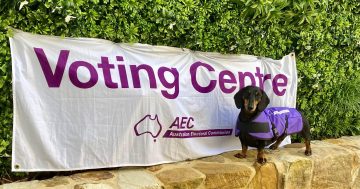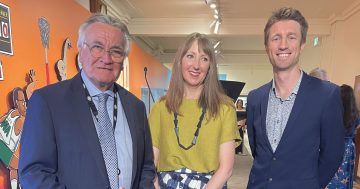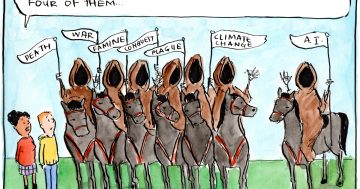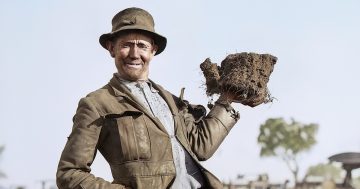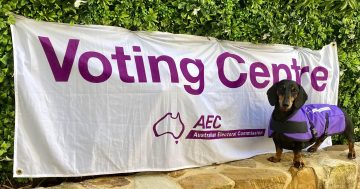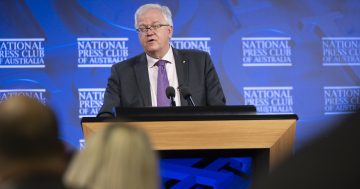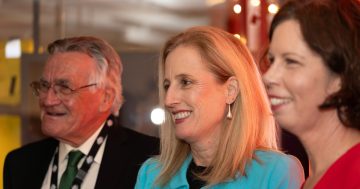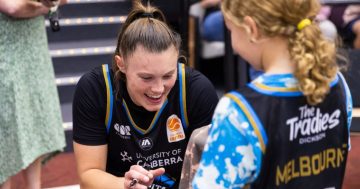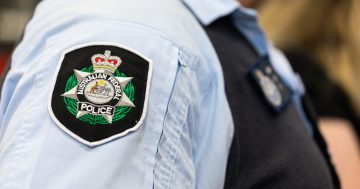
Midnight Oil’s Redneck Wonderland megaphone from 1998, from the Museum of Australian Democracy Collection. Photo: Supplied.
If you’ve lost faith in our leadership, no matter who you voted for, you’re not alone. Political trust is in worryingly short supply, according to collaborative research from the University of Canberra and the Museum of Australian Democracy at Old Parliament House.
This week, MoAD launches their Democracy – Are You In? exhibition. Director Daryl Karp says it’s a call to action. “I think that democracy around the world is under serious threat. This is our contribution. It’s about giving people a voice that does count, one that says ‘Be involved. Don’t step away.”
The starting point was evidence that we’re increasingly disconnected from government. The Edelman Trust Barometer, which measures these things worldwide, says that only 35% of Australians have faith in our government. It’s all the more concerning because we’re a stable democracy with a proud tradition of democratic freedom and consistent economic growth.
Professor Mark Evans who heads the Institute of Governance and Policy Analysis at the University of Canberra says “Our survey data shows a stark decline since the John Howard era. We’ve had some peculiar high profile events that did not play out well in the electorate with the dismissal of several prime ministers.
“When you ask about the characteristics of an ideal politician, the key dimensions are integrity, local connection, and delivery. Trust is earned by creating solid benefits for the community. Nationally, the view is that prime ministers haven’t been effective in getting big-ticket items up, there’s a lot of inconsistency between the rhetoric and what’s being delivered.
“There’s a dominant assumption among politicians that you cannot have complex conversations with the public, but citizens say that’s not true. They expect to have grown up conversations, and they cannot understand why politicians are still engaging in adversarial politics on major issues.”
But the exhibition’s stories about gun law reform, same-sex marriage and the 1967 indigenous referendum also make the point that change requires robust democratic processes. That means citizens must participate.
Visitor engagement from the exhibition will be reported to Parliament’s Joint Standing Committee on Electoral Matters. The exhibition will also be updated using feedback about what Australians want from our politicians.
There’s a huge range of objects illustrating our democratic process. They include an orange beanie from Cathy McGowan’s Indi campaign, badges and t-shirts about everything from anti-communism to saving the Franklin, the Midnight Oil megaphone from 90’s concerts and former Deputy PM Tim Fischer’s .303 rifle.
When PM John Howard responded to the Port Arthur massacre with the 1996 Firearms Act, it was a tough sell to Fischer’s rural constituency. Fischer says of his rifle, now donated to MoAD, “It’s a product of Australia, passed down from my father but when I sold the farm at Boree Creek, I thought, well, it has another role to play. Even a deputy PM can give up his gun.”
“I doubt Australia would have resolved the guns issue so well, had social media existed in 1996 and ’97. What’s changed now is that even a sensible proposal immediately goes to the extremes before any consideration of its merits. There’s a whole new template that breaks the bond between elected leaders and representatives. That’s made it a different ball game.”
Marriage equality also engendered intense debate. Greens leader Senator Richard di Natale, whose rainbow striped sneakers are also at MoAD, says that “As much as I rejected the plebiscite process, it was a sign of the community coming together and a very strong campaign to shift public opinion.”
Pointing to declining support for major parties, he says “It’s interesting that people are voting for disruptors to the status quo. There’s a thirst for something different from a political system totally captured by other interests. The challenge is to provide genuine, enduring alternatives, for which people are searching. We can all do that by continuing to build a movement for change.”
Democracy: Are You In? opens from August 9 at MoAD.
So what about you: do you trust our democracy?












